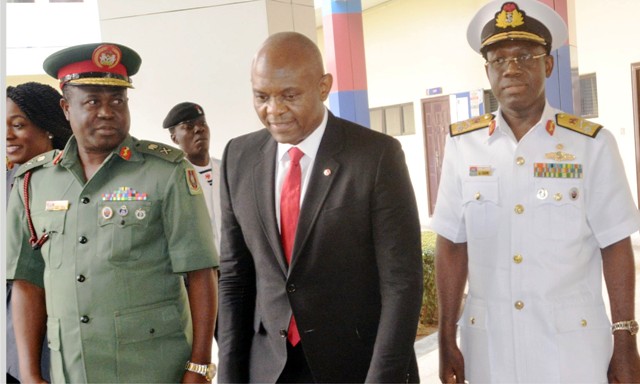Editorial
As Workers Celebrate May Day …
May 1 is a special day set aside by the international labour movement to commemorate the importance of the dignity of labour, honour workers for their sustainable productivity and celebrate them for the critical role they play in national economic growth and development as well as restrategise on best ways to improve the welfare of the working class in the socio-economic equation.
It is usually a day marked by parades, marches, barbecues and, in some cases, demonstrations and protests, designed to pressure policy change for improved working environment and conditions, and also remember the sacrifices of the working class in oiling the wheel of economic development of the world.
Workers Day, also called Labour Day, was officially recognised as an annual event in 1891 to commemorate sacrifices of victims of the May 4, 1886 Haymarket Massacre in Chicago, which occurred as a result of police attempts to forcefully disperse workers on a general strike pushing for implementation of the eight-hour workday.
The Tide believes that this year’s theme of the International Labour Day, “Uniting Workers for Social and Economic Advancement”, is not only apt but feeds into the organised labour’s long quest to extricate itself from the shackles of slave labour, neglect, deprivation, suppression, victimisation, unequal pay and outright underpayment for hours of stressful labour while contributing meaningfully to society’s desire to enhance economic growth and development as a precursor for overall peace and prosperity.
Indeed, if May Day succeeds in ‘uniting workers for social and economic advancement’, it would have significantly addressed the demands of the struggling working class, especially the low and underserved middle classes, for better pay and improved working conditions, including reasonable and accessible pensions.
This is why we admonish employers of labour to seize the opportunity offered by the theme of 2019 Workers Day celebration to resolve the many challenges facing workers in the workplace. These include casualisation, discrimination and victimisation of certain categories of workers, ensuring equal pay for workers on same string of jobs, reasonable and responsible insurance and pension schemes that guarantee quality future for workers, applying best practices, deploying good working tools and providing enabling environment for increased productivity as well as implementation and payment of agreed and acceptable wages and remunerations, including the N30, 000 new national minimum wage, where applicable.
While we acknowledge that certain conditions, especially inconsistent government policies, poor power supply, high rate of insecurity, hostile working environment engineered by decades of bad governance by the military and the political elite, and the attendant uncontrolled social dislocations have combined to negatively undermine the capacity of the employers to meet the yawning needs of workers, we feel that when both parties work together, a lot more can be achieved collectively and peacefully.
At a time when returns on investments in the economy are consistently on a downward slide and government’s capacity to shore up public confidence is waning incrementally, all stakeholders need to forge a common front to trigger economic revival, and stave off total national economic collapse.
We advise politicians to think out of the box, imbibe creativity, and muster the will to initiate bold policies and programmes that create jobs and ensure sustainable economic growth and development. They should also implement and enforce wider but humane tax windows to boost revenue.
Besides, they should ensure that agreements reached with organised labour, at all levels, are strictly implemented across board, including the new minimum wage. A situation where some state governors have made it a point of duty to always complain of lack of funds to pay the new wage is totally unacceptable, as we believe that all state governments have the capacity to pay the N30,000 minimum wage, if they individually place their priorities right.
While we join organised labour to celebrate the courage and sacrifices of victims of the Haymarket Massacre and the struggles of workers over the years, we urge labour leaders across the country to ensure they deliver on the holistic implementation of the new minimum wage.
In addition, we challenge them to walk the talk by ensuring optimum utilisation of available human capacity to drive productivity with a view to increasing the Gross Domestic Product (GDP).
Although we recognise that the deployment of technology, Artificial Intelligence and the 5G Revolution poses serious threat to the requirements of human physical labour in the workplace, we task workers across all sectors to internalise the message of this year’s May Day and put in their best to industrialise the economy for the good of society.
Therefore, as workers celebrate May Day today, we urge all stakeholders to collaborate in efforts to entrench a progressive economy as the core engine of growth and development for posterity. That is the natural reward for the sacrifices labour has made to give our planet an economy that strives to meet the insatiable consumption desires of humanity. We celebrate the contributions of workers to today’s global economy. Bravo, Nigerian workers!
Editorial
Resurgence Of Illegal Structures In PH
Editorial
Certificate Forgery, Loss Of Public Trust

Editorial
In Support of Ogoni 9 Pardon

-
Sports5 days ago
Winners emerge at TotalEnergies charity golf tourney
-

 Business4 days ago
Business4 days ago‘Entrepreneurs, Not Foreign Aid Drive Nigeria’s Growth’
-
News4 days ago
FG Scraps Mother Tongue As Teaching Language In Primary Schools
-
Health4 days ago
Nch Technical Session Reviews 35 Memos …Sets Stage For Council Deliberations
-

 Politics4 days ago
Politics4 days agoOsun 2026: INEC Challenges Political Parties On Lawful Primaries
-
News4 days ago
Eastern Port Police Boss Promises On Crime-Free Operations
-
Sports5 days ago
Bank, Lagos affirm support for sports development
-
Business4 days ago
FG Set To Launch Free National Financial Literacy Training For 100,000 Youths,

